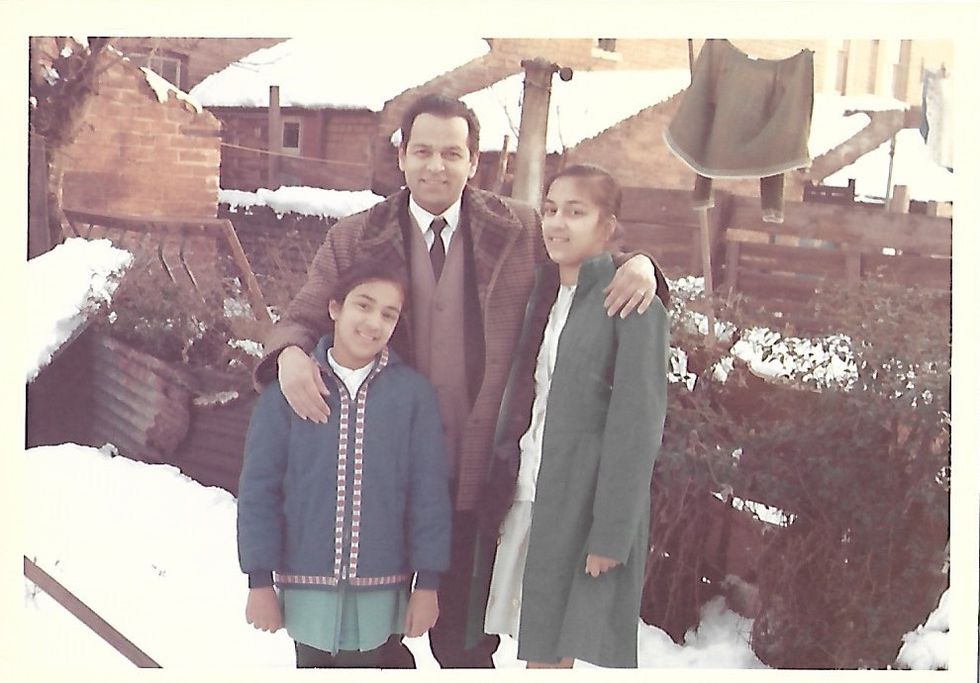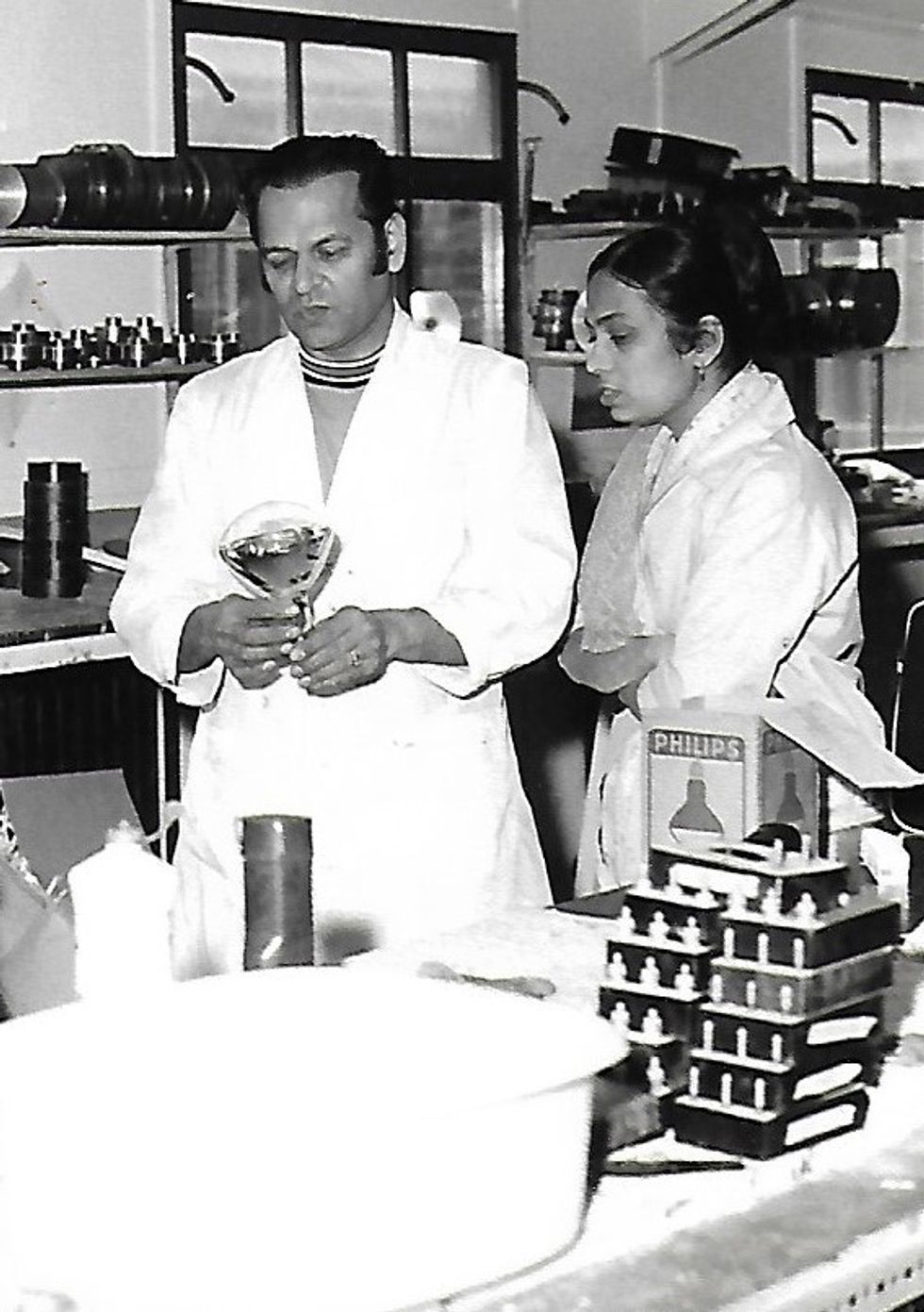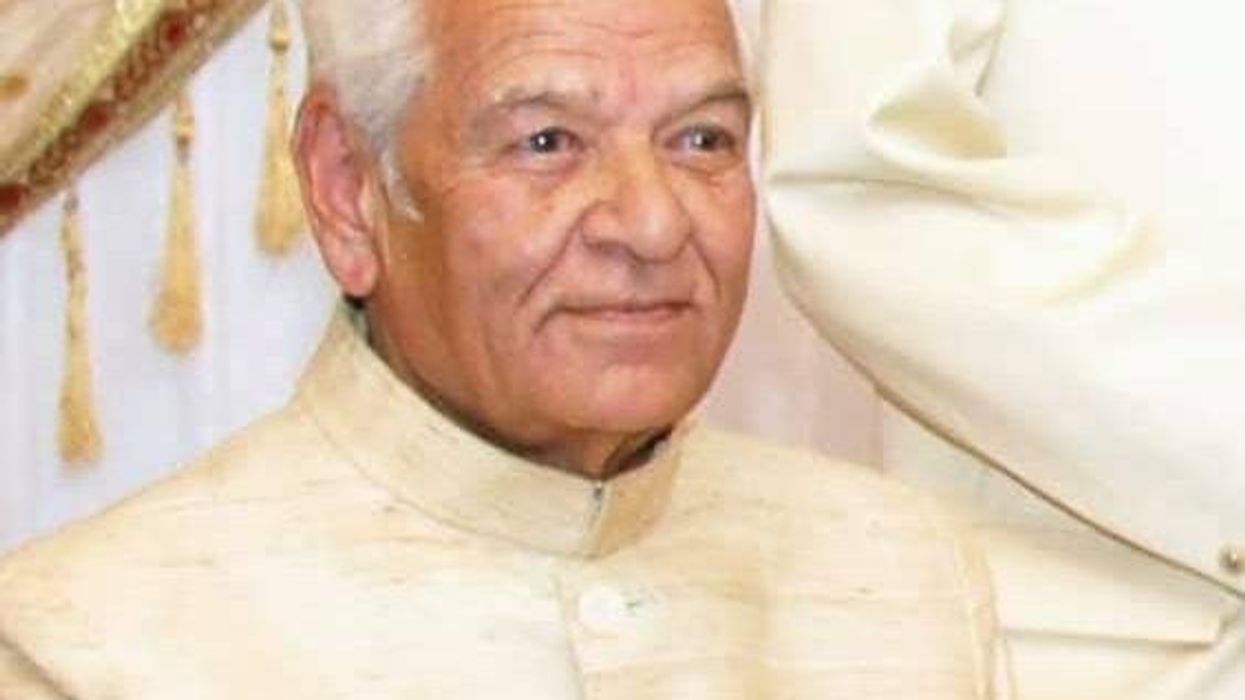Family lead tributes to entrepreneur and inspiring community leader
Alka, Ranna, Nisha and Miraj Patel: Our pappa accomplished tremendous things in various sectors – in industry, Hindu religion, community affairs both in the UK and in India, but at the same time, he was a loving and exciting family man. He and our mummy, Madhukanta, gave us many memorable experiences.
As children we remember him always filling our days with different activities. On a nice summer’s evening, our mummy would pack our simple meal of shak and roti and we would have a picnic. We had days out around the country visiting historical buildings, took beach trips, went to bookshops and saw the Blackpool illuminations every year.
Often, on a Sunday afternoon, after the whole family were involved in helping to wash and polish his Mini car, we would be taken to Southport to pass time in an amusement arcade. We were not allowed to sit in our bedrooms or watch TV alone, but to be involved as a family – in gardening, cooking, preparing for gatherings, talking to visitors who came to the house, and social visits.
In later life, we all travelled extensively with pappa and mummy, enjoying worldwide sightseeing and relaxing together.

Pappa had a keen interest in education and was appointed by the education committee as school governor in two local schools. He encouraged us to study and have fun. He told us, ‘it is only through hard work that you can achieve whatever so you desire’ and he has proved that.
He enabled us as girls growing up in the 1960s and 1970s that we had a voice and we should have opinions on matters. He took us to extracurricular activities such as the Duke of Edinburgh, school choir practice, hockey matches, to Christian Aid fancy dress competitions and also to Molyneux to watch his football team, Wolves, play – this was way before fancy stadiums were built.
He was generous with his time. When he started his business, we were taken along at a young age, taught to answer business calls and we were taken to business dinners he hosted.
Pappa could be a strict father, but he gave us sound advice throughout his life and never spoke badly about anyone. We were told to lead an honest life, be truthful at all times, give service to others and be caring towards everyone. He continued to guide his grandchildren and great grandchildren too, and was an active grandfather and great grandfather to them.
We miss you Pappa, love you so much. We’re proud to be your family and will uphold your values.
Jayesh Patel, president, Shree Mandir Gamseva Mandel UK: My memories of Dahyabhai J Patel, or kaka (uncle) as we referred to him, are from my early teens, when I met him at our annual gam (village) meetings in the mid-1980s.
By then, the Shree Mandir Gamseva Mandel UK group was up and running. Kaka, the founder, my father and Rambhai, to name a few (as there were many others) started the UK Mandel group in 1981.
It was only after a few years that I started to understand that the gam meetings were not just a social gathering of everyone in the UK who were from the same village in India and shared a common togetherness; it was about ‘gamseva’; a word that Kaka mentioned many times in his address.
Gamseva means to help. ‘What shall we do this year to help our gam back home’, Kaka would say, knowing that he had a big list up his sleeve.
Kaka, like many others, came to this country in their mid-30s, trying to settle down in a new world to provide and start a better life for their families and seek opportunities for the future. They spent half their lives in India and hence they knew about the lives of others – how they lived, their day-to-day challenges – they knew their roots.
By the late 1980s-early 1990s, there were four or five large community projects on the go. Among them was the development of a water tank in a village which supplied fresh water to homes; the acquisition of land within the village and development of a crematorium; major extensions to the primary, secondary and high school buildings; and repairs of the main mandir (temple), to name just a few.
I saw Kaka as an inspiring leader, a figurehead, an instigator and a man who made things happen. Over the years, with his drive, foresight, hard work and entrepreneurial spirit, Kaka developed his own successful business.
He was a very noble man and shared his prosperity with village projects, UK communities and many other charitable programmes. He said, ‘What am I going to do with it, we can’t take it with us’, when talking about prosperity.
This leads me to another important word – karma.
Throughout Kaka’s life, he used his wisdom, strength and resources to help people have a better life in England and in India. His contribution and time devoted to these causes was unprecedented.
By far one of his major achievements was the joint venture with the local government in India to deliver a community hospital in Mandir village, which was opened in April 2003 by then Gujarat chief minister Narendra Modi. Today, it is a free service that serves thousands of people across several nearby villages and towns.
Kaka did not think about himself but others. He did not think about what he had but what he could give. He did not want gratitude but to see people, children having a better life. He wanted to give back opportunity, something he was given and that is true karma.
Ramanbhai D Patel, brother-in-law and friend, Stafford, UK: I met Dahyabhai in 1968, when I married his wife’s younger sister and later moved to the UK.
We shared a background in electrical engineering and enjoyed each other’s company – we would visit each other every month. When I was looking for a job, I had three offers and Dahyabhai helped me choose the right one at GEC in Stafford (where I worked until retirement). In 1970, Dahyabhai provided me with guidance to move into my semi-detached Edwardian home in Stafford (which is home to this day).
Dahyabhai was a humble gentleman, known for his impeccable manners and a touch of British politeness. He believed in giving to the community. He became a member of the Wolverhampton education committee and gave a voice to minorities in education. This was recognised by the Education Authority. When Dahyabhai realised that there was no cohesion, unity or guidance among the Gujarati community in Wolverhampton, he set up a Gujarat Samaj and Gujarati Association.
In the early 1980s, Dahyabhai moved with his family from his well-established Wolverhampton home to Walsall, where his business flourished. In Walsall, he helped in acquiring a derelict land to build an Hindu temple called Shree Ram Mandir and, along with others, spent hours collecting funds to achieve this goal. Dahyabhai arranged for popular spiritual leader Pujya Morari Bapu to visit the mandir (including accommodation at Dahyabhai’s home for Pujya Morari Bapu himself).
Dahyabhai had not forgotten his original roots and visited India regularly with his family. He shared his acquired wealth with local communities in India.
Narshibhai M Patel, late Bhanuben and family, Mogar/Walsall, UK: Dahyabhai Jinabhai Patel was my very close friend. He came to Walsall in 1964. I was part of the Kenya Social Association Bhartya Gujarati and through this I knew him as a social worker who settled in the West Midlands before I came to the UK in 1970.
He was pivotal in forming the Shree Hindu Mandir committee in the West Midlands when there was no Hindu temple.
I have been privileged to have had such a close friendship with him. He was a true philanthropist who was involved with many charitable organisations. He was an active fundraiser, a keen gardener and a generous donor.
Dahyabhai was a well-respected and a valuable member of our Walsall Hindu community who raised funds for the temple and dedicated time to serving the community and society. He was personally involved in helping the mandir committee look after building contractors when changes in plans were required during its construction. He played a major part with the trustees until 1991, when the first phase was completed for the Pran Pratishta. In 1993, the second Murti Pran Pratishta programme was completed and celebrated. We faced several challenges to get the temple built and members of our community were patient as they were all keen to see our dream come true.
Dahyabhai was involved in promoting the International Friendly Society of India.
Hindus believe that any murtis (idols) of deities that are damaged need to be replaced. At the Shree Ram Mandir, the shivling had some dents, so Dahyabhai not only suggested but also decided to replace it with a new one, along with his wife Madhuben D Patel, Ramanbhai B Patel (treasurer) and myself (trustee). While in India, the four of us travelled in his car to Ahmedabad to choose a suitable shivling. It was ordered and installed in the Shree Ram Mandir, Walsall in 2013.
Dhayabhai had numerous contacts with priests and saints, and this benefited the Shree Ram Mandir in Walsall.
Pujya Ram Bapa had been in close contact with him and his family, who generously donated all of the murtis of deities. I personally had an amazing opportunity to meet Pujya Ram Bapa at our temple, with Dahyabhai.
Amisha Patel, niece, New Jersey, US: My uncle, Dahyu Masaji, was known to be the leader in our family. I recall the proud moments when the Shree Ram Mandir was opened and also when we would travel to Walsall for garba, managed by my Masaji, the temple’s president, and their team.
During the summer holidays, I would stay with my Masaji, and Masi in their home and spend time with them, being spoilt, playing in their garden, feeding the fish. Masaji would do the barbecue and drive around in his flashy cars.

Masaji was my second father – he provided me with great guidance, helping me choose between doing a geology and chemistry degree while at university. Dahyu Masaji told me to study what made me happy, so I chose chemistry. He encouraged me to study, reach higher and he enjoyed listening to my progress.
In 1995, Masaji led my wedding plans and I merely showed up on my wedding day. The hall accommodated 1,800 guests and the ceremony was perfectly managed. He watched my family grow.
Hitesh Patel, nephew, San Diego, US: As a young child growing up my memories of Masaji were of a man who not only brought kindness, joy and love to me, but also to all those around him.
I spent many summers as a child and later as a teenager on vacation in Walsall, gardening, talking about cars, geeking out on the latest gadgets Masaji had acquired and spending time with him and working alongside his delightful employees and my relatives at his factory. This truly was the highlight of my vacations.
I learned a lot of life lessons from Masaji during my childhood and in later years of my life. I left the UK in 1994, and the attributes he instilled in me I try to practise and hold dear to me to this day living in the US. For example, being empathic towards not only family and friends, but also all who we interact with in life – a sense of “paying it forward in life”.
I learned about true philanthropy through his numerous selfless community activities in Walsall and India, and also, finally, learned how to cultivate the perfect tomatoes.
I have it easier with the climate now since I live in San Diego, but every time I pick the perfect tomato in my garden, it brings a smile to my face and memories flooding back of doing the same with him in his greenhouse.
Dr Rambhai M Patel: My brother-in-law Dahyabhai was a kind person and advised family members and others in the community. He was a forward-thinking man and worked to improve the lives of people in the UK and India. His work inspired us all.
Gulabbhai Patel: As president of the Shree Mandhata Samaj, Walsall, I had the pleasure of working closely with Dahya kaka who was a mentor to me and provided valuable guidance. He tried to build the samaj and Shree Ram Mandir into strong, community-focused places for everyone to enjoy while maintaining relations between young and old, both within and outside the samaj and mandir. He was even willing to buy a community hall for the samaj, which showed his true generosity and charitable nature. His positive thinking and ambition made him a great role model who I have learned a lot from.




